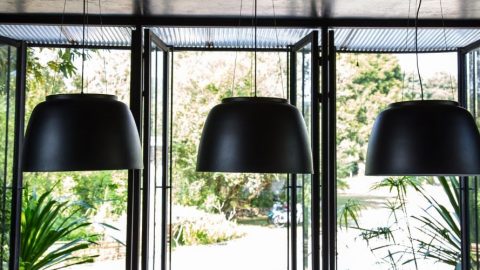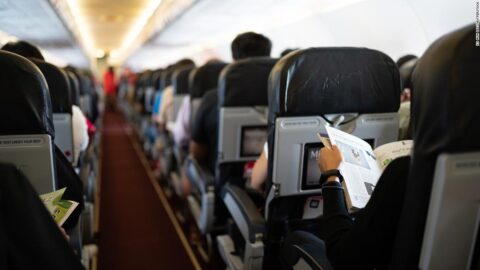(CNN) — So, you’re all set for a trip to Europe in this most uncertain of summers. You’ve booked your flight, navigated all the paperwork for your destination (and for getting home), and have prepared yourself for snafus along the way. Oh, and you’re fully vaccinated.
Now, just a couple more things — time to book the hotel and the car rental. The former shouldn’t be an issue, although places are booking up fast. And the latter is never a problem — you can always leave it till the absolute last minute, right?
You’re in for a shock. Because this summer, what’s being described as “carmaggedon” is hitting the continent.
An unprecedented shortage of cars means prices are sky high — and that’s if you can get one in the first place. It is, according to one industry insider, a “disaster for renters.”
Rocketing prices

Tourists going to Malaga had better stay on the beach, rather than rent a car at these rates.
Jorge Guerrero/AFP via Getty Images
Take, for example, Malaga. The town is the entry point to Spain’s popular Costa del Sol for hundreds of thousands of tourists each year. Those tourists are used to paying a couple of hundred dollars a week, maximum.
But to book a car this weekend for a week, the cheapest CNN could find was a compact car with Avis, for $548.
Germany seems a smidgeon better. You could rent a Fiat 500 from Munich airport this weekend for $484 for a week.
Over in Italy, things are even worse.
A week’s car rental from Bologna airport — typically one of the entry points to explore the neighboring region of Tuscany — costs a whopping $1,800 with Italian chain Locauto. Perhaps, you might wonder, it could be a Maserati — after all, we’re in the region which produces luxury cars including Ferrari and Maserati.
But no — it’s an oh-so-humble Volkswagen Golf.
If, meanwhile, you’re keen to escape the heat of Florence and explore Tuscany outside of its cultural capital for the weekend, that’ll cost you a cool $886 for three days, booked a day in advance. Again, that’s for the cheapest car — a Fiat 500 Cabrio, as provided by Sicily by Car. If you’re a family and need a people-carrier, that’ll be a cool $1,536.
Of course, booking at the last minute is always more expensive, but never this much so. And anyway, prices are still expensive across the board — a week from July 31 from Bologna, starts at $452 for the smallest car.
Over in Greece, it’s the same story.
“Much of this has been down to reduced fleet sizes due to [underestimating the] number of travelers and this short supply has now driven up prices.”
A ‘disaster for renters’

People wait in line at Enterprise rental agency in the Miami International Airport Car Rental Center in April 2021 in Florida.
Joe Raedle/Getty Images
The problem, of course, is due to the pandemic — but it’s also due to the long-term nature of how car rental businesses operate. Unlike other sectors, which have been able to react quickly, car rental companies work several months ahead, so can’t turn on a dime.
Essentially, car hire companies tend to order their fleets about two or three months in advance, at the start of the year — and, having been stung with the low demand last year, they hedged their bets this year.
In fact, Sixt confirmed to CNN that its latest figures show that for Q1 of 2021, it had 93,200 cars across its global network. That compares to 130,900 in Q1 of 2020, and 129,200 for the same period in 2019. That’s a 29% decrease in vehicles, year on year.
What’s making the situation even worse is that there’s currently a delay on new cars being delivered from manufacturers, because of a global “chip crisis” — a lack of “chips” which are needed to run advanced functions in the cars. Partridge says it took six months to get his own new car.
“There was uncertainty about what demand was going to be there this summer, and there was a wholesale reduction in fleets last year, and I think they’ve struggled to restore them,” says Partridge, whose firm aggregates and books cars from 200 suppliers worldwide.
“My assumption is that there’s so much uncertainty [with travel restrictions] that the businesses don’t want to invest massively in restoring fleets, and then governments turn off the tap for travel.”
He points to Portugal, which was the first mainstream destination to make the UK government’s “green list” for travel in May — but was deleted just a couple of weeks later.
“If you invest for, say, Faro, Hertz has probably got 500 cars there — it’s a huge capital investment to gamble if the traffic isn’t there.
“But even if they had ordered 1,000 new cars for Portugal, that’s not something that’ll be turned around in a month.”
Neither the Hertz nor Avis groups responded to a request for comment.
But Sixt acknowledged the current supply issues, with a spokesperson telling CNN:
“In the course of the loosened mobility and travel restrictions as well as the increasing vaccination rate, people are longing to be mobile and travel again.
“We are currently seeing high demand especially in tourist areas, where the demand has now almost reached the level of 2019. This is met by a shortage in availability of rental cars.
“The reasons for the shortage are, on the one hand, the low supply of vehicles due to the chip crisis and the reduced production capacities of some car manufacturers; and on the other hand, the reduced rental car fleets in the wake of the corona crisis and the sharp decline in demand.”
Partridge says he’s only seen things like this once before — after the 2008 recession.
“There was a huge shortage in Spain — companies offloaded a lot of fleet because they anticipated a huge lack of demand, but demand was through the roof and there was a shortage,” he says.
“It’s not dissimilar now. The prices are reacting to a lack of availability.”
Struggling to survive

An empty lot at the National rental agency in the Miami International Airport Car Rental Center.
Joe Raedle/Getty Images
There’s no doubt the car rental industry is in a tough spot.
In 2020, he says, Knowleggi’s turnover was just 30% of what it was in 2019.
“If foreigners don’t come, there’s only the business market, and that doesn’t shift all the cars in Italy — only tourism does,” he says.
Zampi says that he usually orders his cars six months in advance — not buying them, but leasing them.
“It takes months — we do our agreements in November every year to have the fleet ready for the start of the season, at Easter,” he says.
But with Italy in stop-and-start lockdowns all through the winter, nobody wanted to risk putting in big orders.
“Now tourism has exploded,” he says, pointing to the border easings which now grant free rein to Americans, Canadians and Japanese residents, as well as Europeans.
“Until June, we were hiring out 20% of our vehicles, but now we’re at 100%.
“But if I order more cars now they’ll arrive in two months — at the end of the season.”
Upping prices for desperate customers

The hill roads of the Val d’Orcia are about to get a lot pricier if you’re renting this year.
Filippo Monteforte/AFP via Getty Images
It’s that enormous gulf between supply and demand that’s causing the out-of-control prices on display in Europe this summer, he says.
Most of the big companies will raise prices when demand is outstripping supply — just as airlines do.
“If you’re looking at $250 a day, they’re putting insane prices on because it either means that they have just one car left, and it’s of a superior class, or they’re looking for one,” he says — explaining that the big brands will often send out staff to the smaller rental companies, asking to “borrow” a car.
“But the people out looking want to be paid too, so the price will be exceptionally high,” he says.
If you’re prepared to ring around yourself — and find the smaller companies in a city — you could save as much as 50%.
In Florence last weekend, the cheapest car hire to be found online cost $422 with Hertz for two days, when CNN Travel checked.
But by phoning around the smaller companies, we found a car with Knowleggi for just $88 per day.
That’s because, says Zampi, they’ve stuck to their rates from summer 2019, “because we respect our clients.”
“People were used to renting for $50 a day. If you ask them now for $150, is that good publicity? It’ll come out in the reviews,” he says.
This year, small is beautiful

With tourists flooding back to Europe, destinations such as Florence (pictured) are getting full — and there are no cars to go around.
Alberto Pizzoli/AFP via Getty Images
In short, this is perhaps the summer to try out a smaller company you don’t know.
“Smaller local agents are always cheaper,” says Partridge.
“They have fewer overheads, marketing spend, and they tend to be off-airport [an airport presence has vast overheads, he says].”
“And although the rates are always higher, I think the gap has widened quite significantly this year.”
That may sound alarming if you’re normally the kind of person who prefers to go with a major firm, assuming that there’ll be more protection or recourse centrally if it goes wrong.
Partridge says there’s nothing to worry about — not in the era of online reviews.
“There are local agents who appear on platforms such as ours, and some that don’t appear on comparison platforms — you can often find a guy on the street with a coffee, willing to let you drive off for $50 a day,” he says.
“There’s generally an underlying feeling that people would prefer a big agent — it’s familiar service, they think they’ll be more reliable, if they book a Ford Focus they’re more likely to get it, and the car will be new or nearly new.
“In Cyprus I once booked a Ford Focus and was given a seven-year-old Honda Jazz with 80,000 miles on the clock. I don’t think you’d get that with a larger agent — but I complained and they swapped it.”
He recommends looking at customer ratings on platforms (such as his own, of course), or ones like Trustpilot and Feefo — though he warns that rating websites are “not without their own issues.” He also suggests asking for local recommendations from your hotel or villa owner.
But Zampi says there’s no need to panic — in fact, he argues that smaller companies are more likely to look after you.
“People are always afraid of small rental companies but we always try to keep our clients — for me, it’s important the client returns, whereas for Avis, it doesn’t matter. If you leave Avis for Hertz they don’t care, as there’ll always be someone leaving Hertz for Avis,” he says.
“If you bring a car back to me with a scratch, I won’t make you pay, unless you make a dent. But if you go to a big company they make you pay not only for the scratch, but for four days of the car being out of commission.
“You bring back the car with no gas in it, I’ll charge you for the gas plus $17 refueling charge. But firms will charge you for an entire tank.
“It’s always about the reviews. Big firms don’t care about reviews. But for me, a bad review is bad publicity, so I always try to meet the client halfway.
“Wherever you are renting, a small company’s interest will always lie in coming across well to the client. We have so many clients who come to us through word of mouth. It’s about meeting the client halfway, and not taking advantage of them. That never happens with a small company.”
Working out how much a private or coach transfer would be, instead of a car, is also an option, says Vinales, of Olympic Holidays — they’re trying to help out guests with this where they can.
But most importantly, says Partridge, don’t let your car rental be an afterthought this year. Check out prices before you book your flights — as it might just help you decide where to go.
“If you find a flight you’re happy with, then try to find a car — because finding it costs $1,000 when you were expecting to pay $250 can make a holiday unviable,” he says.
“This year, the rental car may be a factor in deciding where you end up.”







Recent Comments